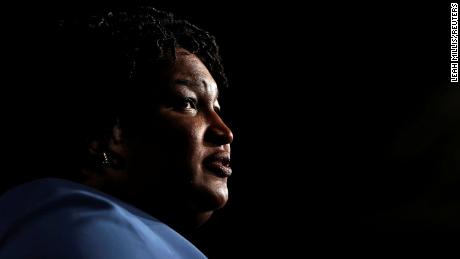Washington (CNN)In a recent interview, Stacey Abrams didn't skip a beat when affirming her qualifications to be presumptive Democratic nominee Joe Biden's running mate: "I would be an excellent running mate."
I, I, I. In speaking about herself -- her achievements, her talents -- in the first person, Abrams did something apparently revolutionary. She challenged the gendered norms that have long plagued women's (especially black women's) political ambitions -- the notion that they can seek power as long as they don't exhibit an earnest desire for it.
Elsewhere in the Elle magazine interview with editor at large Melissa Harris-Perry published on Wednesday, Abrams complicated the story of the race that skyrocketed her to political stardom in 2018.
"I know that my r├®sum├® ... is usually reduced to 'She didn't become the governor of Georgia.' But it is important to understand all the things I did to prepare for that contest," Abrams said of her controversial, wafer-thin loss to Republican Brian Kemp. "That campaign was not a whim. It was the outcome of decades of deliberate work building my capacity to serve as many people as I could, in the most effective way possible."
(Since her defeat, she's held onto that conviction, having launched Fair Fight 2020, a national voter protection initiative, in 2019.)
This narrative reclamation matters. It nods to the fact that, because women -- among others who diverge from the traditional straight white male model of the American politician -- aren't promoted on their "potential" as much as men are, they must champion themselves.
Indeed, instead of distancing herself from the things that even tacit campaigning requires but are uniquely looked down on when women do them -- the many iterations of self-advocacy and swaggering -- Abrams did the exact opposite: She elevated them. All the things I did to prepare. Not a whim. Decades of deliberate work. (Earlier this year, she also spared the self-effacement, saying that she believes that she'll be elected president by 2040.)
Abrams trusts that, if chosen to be Biden's lieutenant, she'll get things done; she is, according to her own testimony and a record to back it up, excellent. And she wants you to trust her, too.
Of course, this isn't to gloss over the very real perils that tend to result when a woman dares to strive in politics or in some way shakes up the prevailing state of things. Recall Elizabeth Warren's presidential bid.
No, the Massachusetts senator didn't run a perfect campaign. But save for a moment atop the polls early last fall, she -- like some of her predecessors who similarly refused to tamp down their aims -- was pilloried in a manner that was difficult to meaningfully separate from the well-documented cultural impulse to punish power-pursuing women.
"Abrasive," "condescending narcissist," "elitist attitude": These are only some of the refrains -- dog whistles, rather -- that detractors used to knock Warren's open displays of ambition.
In this light, Abrams' check-my-credentials comments weren't merely a flex. They were a subtle rebuke of a country that still doesn't know what to make of women who are competent -- and who have no problem demonstrating just how competent they are.




